Corporate Law Case Study: Pre-Registration Contracts and Authority
VerifiedAdded on 2022/10/19
|9
|2322
|177
Case Study
AI Summary
This document provides a detailed analysis of a corporate law case study involving Ozzie E-Vehicles Pty Ltd. The case explores two main issues: the responsibility for breach of contract in pre-registration scenarios and the concept of ostensible authority. The analysis delves into relevant sections of the Corporations Act of Australia, focusing on pre-registration contracts and the liabilities of individuals and companies. It examines principles like ratification, ostensible authority, and the lifting of the corporate veil, applying them to the specific facts of the case. The document concludes with findings on the liability of Michael Danvers and the implications of the actions of various parties involved, including W A Lithium Refineries, AES Limited, Hard Clay, Fine China, and Storage Box. The analysis is structured using the ILAC (Issues, Law, Application, Conclusion) format, providing a comprehensive understanding of the legal principles and their application to the case.
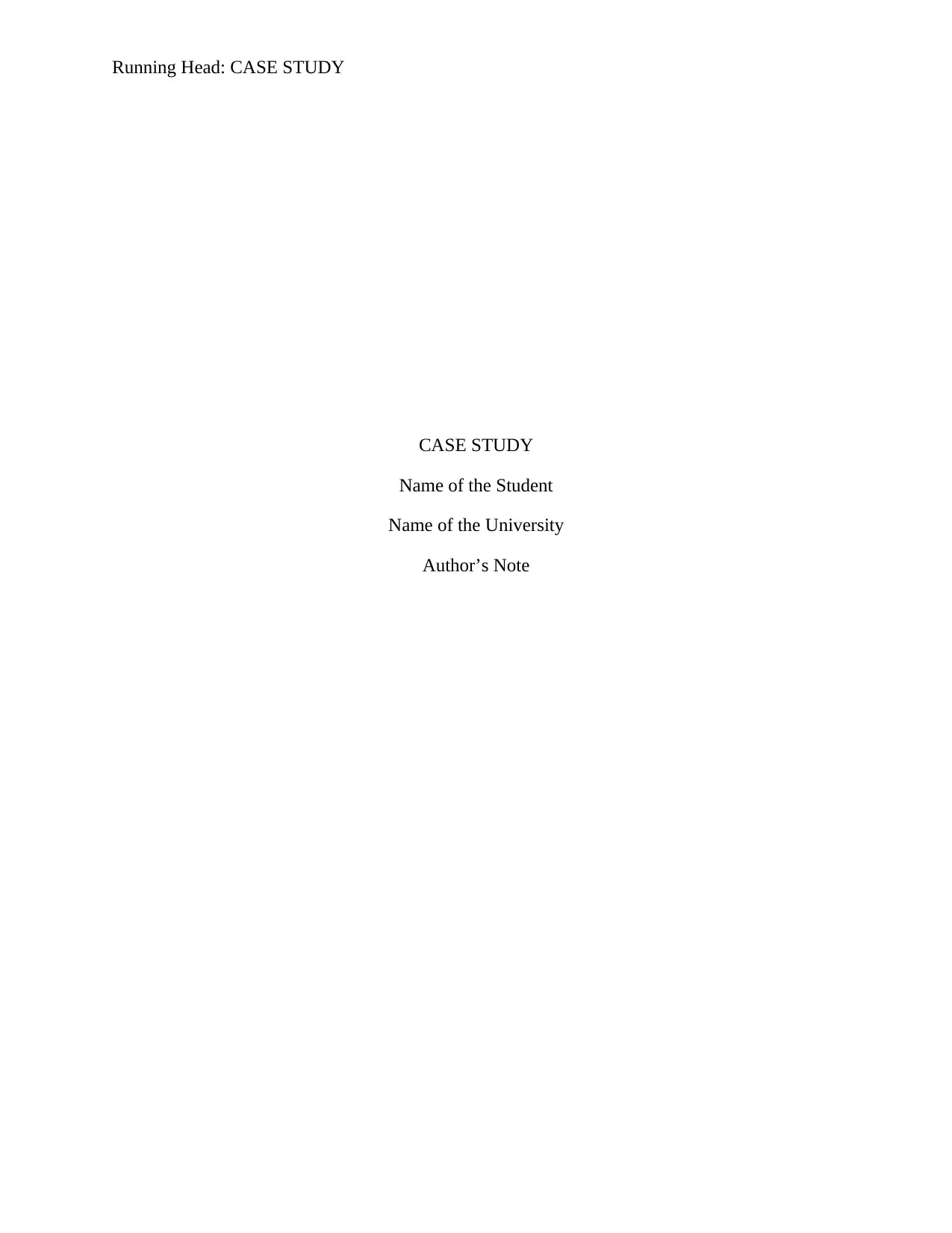
Running Head: CASE STUDY
CASE STUDY
Name of the Student
Name of the University
Author’s Note
CASE STUDY
Name of the Student
Name of the University
Author’s Note
Paraphrase This Document
Need a fresh take? Get an instant paraphrase of this document with our AI Paraphraser
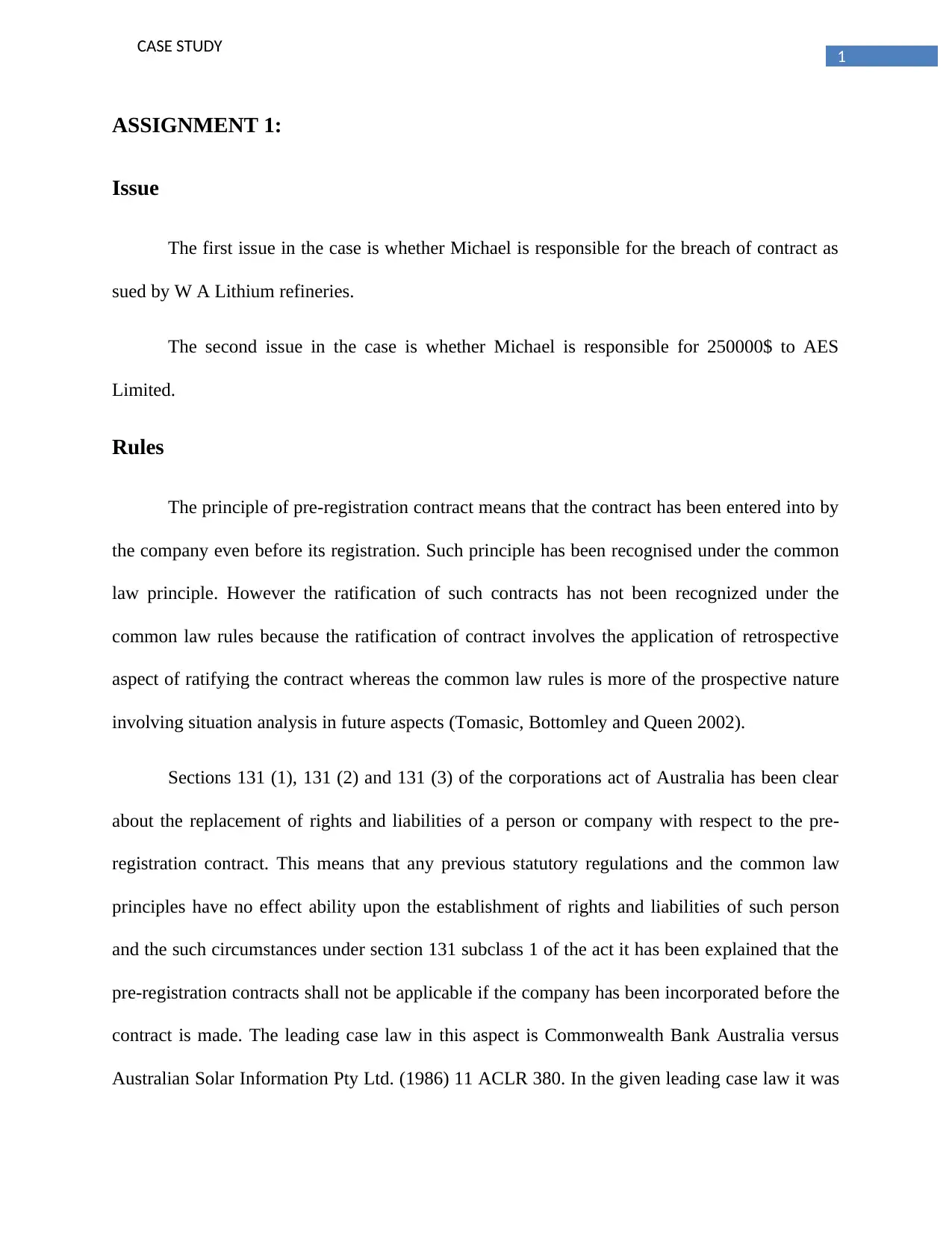
1
CASE STUDY
ASSIGNMENT 1:
Issue
The first issue in the case is whether Michael is responsible for the breach of contract as
sued by W A Lithium refineries.
The second issue in the case is whether Michael is responsible for 250000$ to AES
Limited.
Rules
The principle of pre-registration contract means that the contract has been entered into by
the company even before its registration. Such principle has been recognised under the common
law principle. However the ratification of such contracts has not been recognized under the
common law rules because the ratification of contract involves the application of retrospective
aspect of ratifying the contract whereas the common law rules is more of the prospective nature
involving situation analysis in future aspects (Tomasic, Bottomley and Queen 2002).
Sections 131 (1), 131 (2) and 131 (3) of the corporations act of Australia has been clear
about the replacement of rights and liabilities of a person or company with respect to the pre-
registration contract. This means that any previous statutory regulations and the common law
principles have no effect ability upon the establishment of rights and liabilities of such person
and the such circumstances under section 131 subclass 1 of the act it has been explained that the
pre-registration contracts shall not be applicable if the company has been incorporated before the
contract is made. The leading case law in this aspect is Commonwealth Bank Australia versus
Australian Solar Information Pty Ltd. (1986) 11 ACLR 380. In the given leading case law it was
CASE STUDY
ASSIGNMENT 1:
Issue
The first issue in the case is whether Michael is responsible for the breach of contract as
sued by W A Lithium refineries.
The second issue in the case is whether Michael is responsible for 250000$ to AES
Limited.
Rules
The principle of pre-registration contract means that the contract has been entered into by
the company even before its registration. Such principle has been recognised under the common
law principle. However the ratification of such contracts has not been recognized under the
common law rules because the ratification of contract involves the application of retrospective
aspect of ratifying the contract whereas the common law rules is more of the prospective nature
involving situation analysis in future aspects (Tomasic, Bottomley and Queen 2002).
Sections 131 (1), 131 (2) and 131 (3) of the corporations act of Australia has been clear
about the replacement of rights and liabilities of a person or company with respect to the pre-
registration contract. This means that any previous statutory regulations and the common law
principles have no effect ability upon the establishment of rights and liabilities of such person
and the such circumstances under section 131 subclass 1 of the act it has been explained that the
pre-registration contracts shall not be applicable if the company has been incorporated before the
contract is made. The leading case law in this aspect is Commonwealth Bank Australia versus
Australian Solar Information Pty Ltd. (1986) 11 ACLR 380. In the given leading case law it was
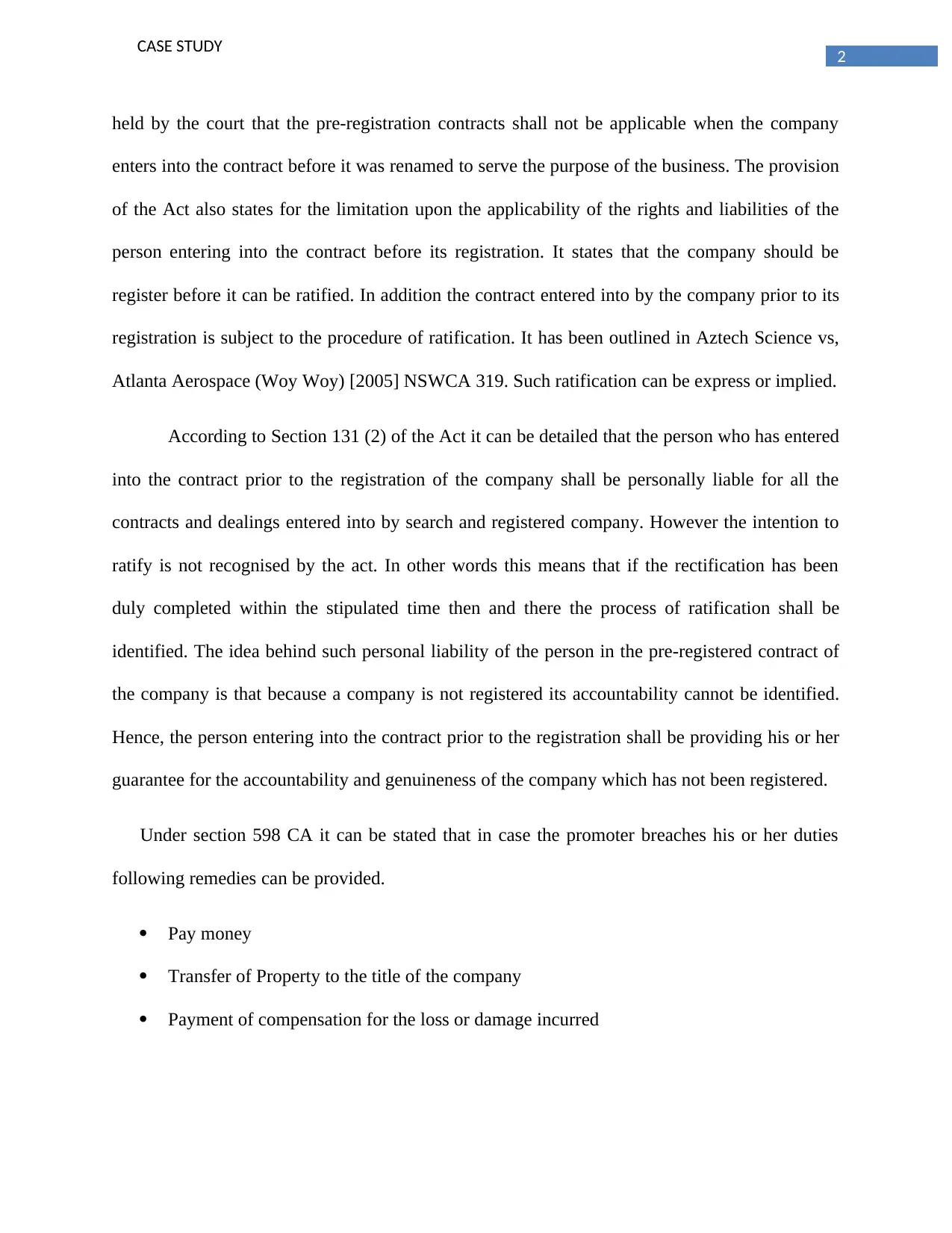
2
CASE STUDY
held by the court that the pre-registration contracts shall not be applicable when the company
enters into the contract before it was renamed to serve the purpose of the business. The provision
of the Act also states for the limitation upon the applicability of the rights and liabilities of the
person entering into the contract before its registration. It states that the company should be
register before it can be ratified. In addition the contract entered into by the company prior to its
registration is subject to the procedure of ratification. It has been outlined in Aztech Science vs,
Atlanta Aerospace (Woy Woy) [2005] NSWCA 319. Such ratification can be express or implied.
According to Section 131 (2) of the Act it can be detailed that the person who has entered
into the contract prior to the registration of the company shall be personally liable for all the
contracts and dealings entered into by search and registered company. However the intention to
ratify is not recognised by the act. In other words this means that if the rectification has been
duly completed within the stipulated time then and there the process of ratification shall be
identified. The idea behind such personal liability of the person in the pre-registered contract of
the company is that because a company is not registered its accountability cannot be identified.
Hence, the person entering into the contract prior to the registration shall be providing his or her
guarantee for the accountability and genuineness of the company which has not been registered.
Under section 598 CA it can be stated that in case the promoter breaches his or her duties
following remedies can be provided.
Pay money
Transfer of Property to the title of the company
Payment of compensation for the loss or damage incurred
CASE STUDY
held by the court that the pre-registration contracts shall not be applicable when the company
enters into the contract before it was renamed to serve the purpose of the business. The provision
of the Act also states for the limitation upon the applicability of the rights and liabilities of the
person entering into the contract before its registration. It states that the company should be
register before it can be ratified. In addition the contract entered into by the company prior to its
registration is subject to the procedure of ratification. It has been outlined in Aztech Science vs,
Atlanta Aerospace (Woy Woy) [2005] NSWCA 319. Such ratification can be express or implied.
According to Section 131 (2) of the Act it can be detailed that the person who has entered
into the contract prior to the registration of the company shall be personally liable for all the
contracts and dealings entered into by search and registered company. However the intention to
ratify is not recognised by the act. In other words this means that if the rectification has been
duly completed within the stipulated time then and there the process of ratification shall be
identified. The idea behind such personal liability of the person in the pre-registered contract of
the company is that because a company is not registered its accountability cannot be identified.
Hence, the person entering into the contract prior to the registration shall be providing his or her
guarantee for the accountability and genuineness of the company which has not been registered.
Under section 598 CA it can be stated that in case the promoter breaches his or her duties
following remedies can be provided.
Pay money
Transfer of Property to the title of the company
Payment of compensation for the loss or damage incurred
⊘ This is a preview!⊘
Do you want full access?
Subscribe today to unlock all pages.

Trusted by 1+ million students worldwide
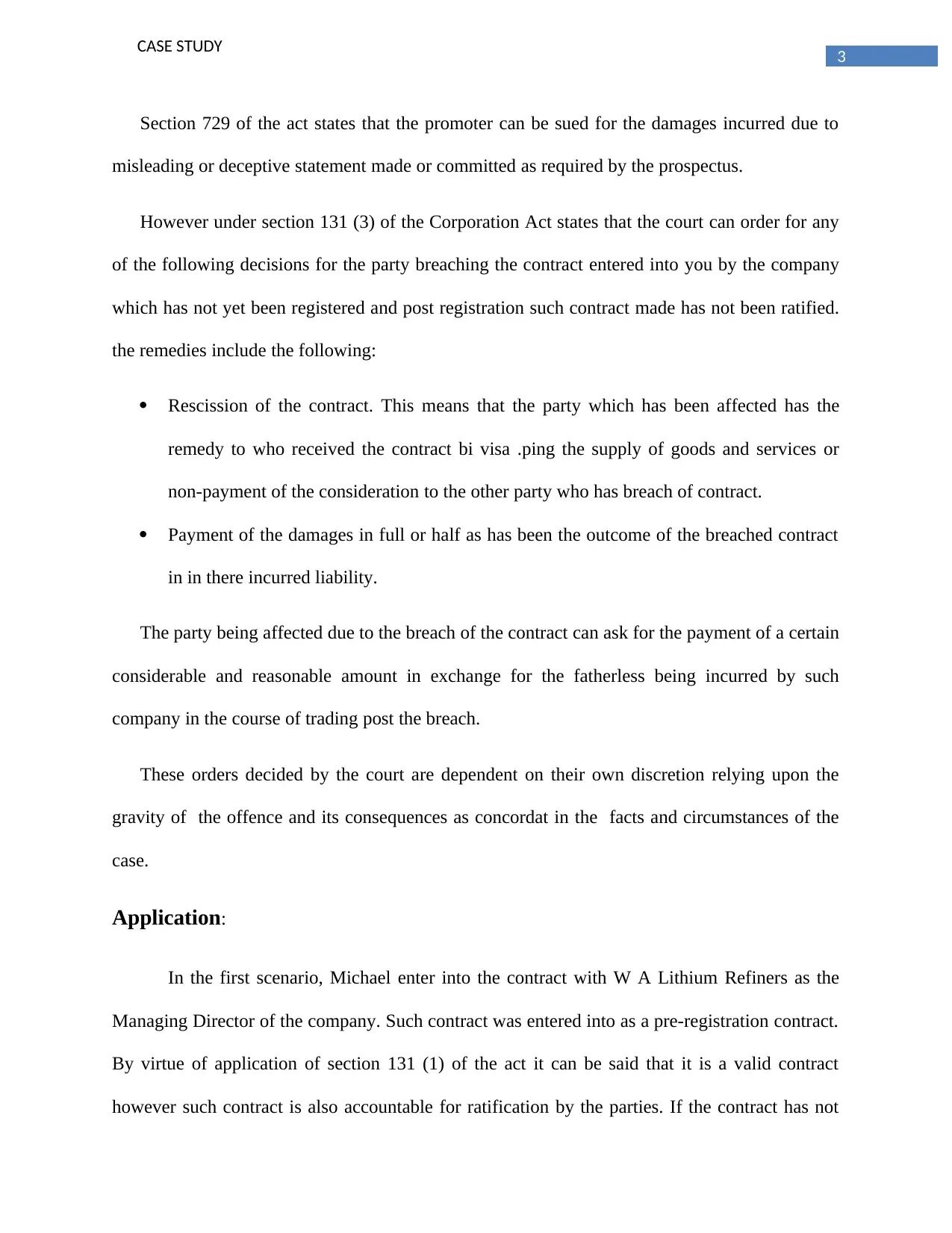
3
CASE STUDY
Section 729 of the act states that the promoter can be sued for the damages incurred due to
misleading or deceptive statement made or committed as required by the prospectus.
However under section 131 (3) of the Corporation Act states that the court can order for any
of the following decisions for the party breaching the contract entered into you by the company
which has not yet been registered and post registration such contract made has not been ratified.
the remedies include the following:
Rescission of the contract. This means that the party which has been affected has the
remedy to who received the contract bi visa .ping the supply of goods and services or
non-payment of the consideration to the other party who has breach of contract.
Payment of the damages in full or half as has been the outcome of the breached contract
in in there incurred liability.
The party being affected due to the breach of the contract can ask for the payment of a certain
considerable and reasonable amount in exchange for the fatherless being incurred by such
company in the course of trading post the breach.
These orders decided by the court are dependent on their own discretion relying upon the
gravity of the offence and its consequences as concordat in the facts and circumstances of the
case.
Application:
In the first scenario, Michael enter into the contract with W A Lithium Refiners as the
Managing Director of the company. Such contract was entered into as a pre-registration contract.
By virtue of application of section 131 (1) of the act it can be said that it is a valid contract
however such contract is also accountable for ratification by the parties. If the contract has not
CASE STUDY
Section 729 of the act states that the promoter can be sued for the damages incurred due to
misleading or deceptive statement made or committed as required by the prospectus.
However under section 131 (3) of the Corporation Act states that the court can order for any
of the following decisions for the party breaching the contract entered into you by the company
which has not yet been registered and post registration such contract made has not been ratified.
the remedies include the following:
Rescission of the contract. This means that the party which has been affected has the
remedy to who received the contract bi visa .ping the supply of goods and services or
non-payment of the consideration to the other party who has breach of contract.
Payment of the damages in full or half as has been the outcome of the breached contract
in in there incurred liability.
The party being affected due to the breach of the contract can ask for the payment of a certain
considerable and reasonable amount in exchange for the fatherless being incurred by such
company in the course of trading post the breach.
These orders decided by the court are dependent on their own discretion relying upon the
gravity of the offence and its consequences as concordat in the facts and circumstances of the
case.
Application:
In the first scenario, Michael enter into the contract with W A Lithium Refiners as the
Managing Director of the company. Such contract was entered into as a pre-registration contract.
By virtue of application of section 131 (1) of the act it can be said that it is a valid contract
however such contract is also accountable for ratification by the parties. If the contract has not
Paraphrase This Document
Need a fresh take? Get an instant paraphrase of this document with our AI Paraphraser
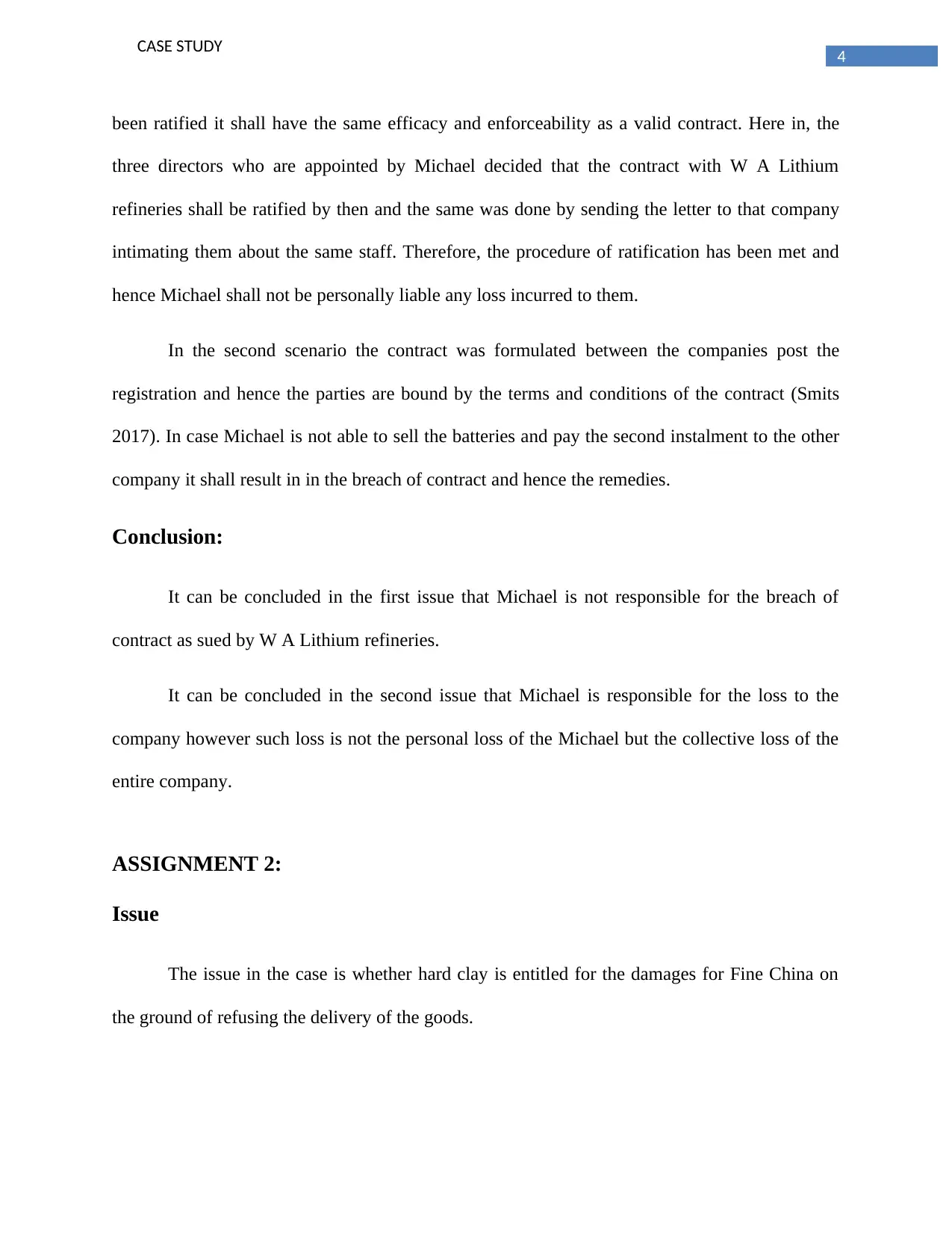
4
CASE STUDY
been ratified it shall have the same efficacy and enforceability as a valid contract. Here in, the
three directors who are appointed by Michael decided that the contract with W A Lithium
refineries shall be ratified by then and the same was done by sending the letter to that company
intimating them about the same staff. Therefore, the procedure of ratification has been met and
hence Michael shall not be personally liable any loss incurred to them.
In the second scenario the contract was formulated between the companies post the
registration and hence the parties are bound by the terms and conditions of the contract (Smits
2017). In case Michael is not able to sell the batteries and pay the second instalment to the other
company it shall result in in the breach of contract and hence the remedies.
Conclusion:
It can be concluded in the first issue that Michael is not responsible for the breach of
contract as sued by W A Lithium refineries.
It can be concluded in the second issue that Michael is responsible for the loss to the
company however such loss is not the personal loss of the Michael but the collective loss of the
entire company.
ASSIGNMENT 2:
Issue
The issue in the case is whether hard clay is entitled for the damages for Fine China on
the ground of refusing the delivery of the goods.
CASE STUDY
been ratified it shall have the same efficacy and enforceability as a valid contract. Here in, the
three directors who are appointed by Michael decided that the contract with W A Lithium
refineries shall be ratified by then and the same was done by sending the letter to that company
intimating them about the same staff. Therefore, the procedure of ratification has been met and
hence Michael shall not be personally liable any loss incurred to them.
In the second scenario the contract was formulated between the companies post the
registration and hence the parties are bound by the terms and conditions of the contract (Smits
2017). In case Michael is not able to sell the batteries and pay the second instalment to the other
company it shall result in in the breach of contract and hence the remedies.
Conclusion:
It can be concluded in the first issue that Michael is not responsible for the breach of
contract as sued by W A Lithium refineries.
It can be concluded in the second issue that Michael is responsible for the loss to the
company however such loss is not the personal loss of the Michael but the collective loss of the
entire company.
ASSIGNMENT 2:
Issue
The issue in the case is whether hard clay is entitled for the damages for Fine China on
the ground of refusing the delivery of the goods.
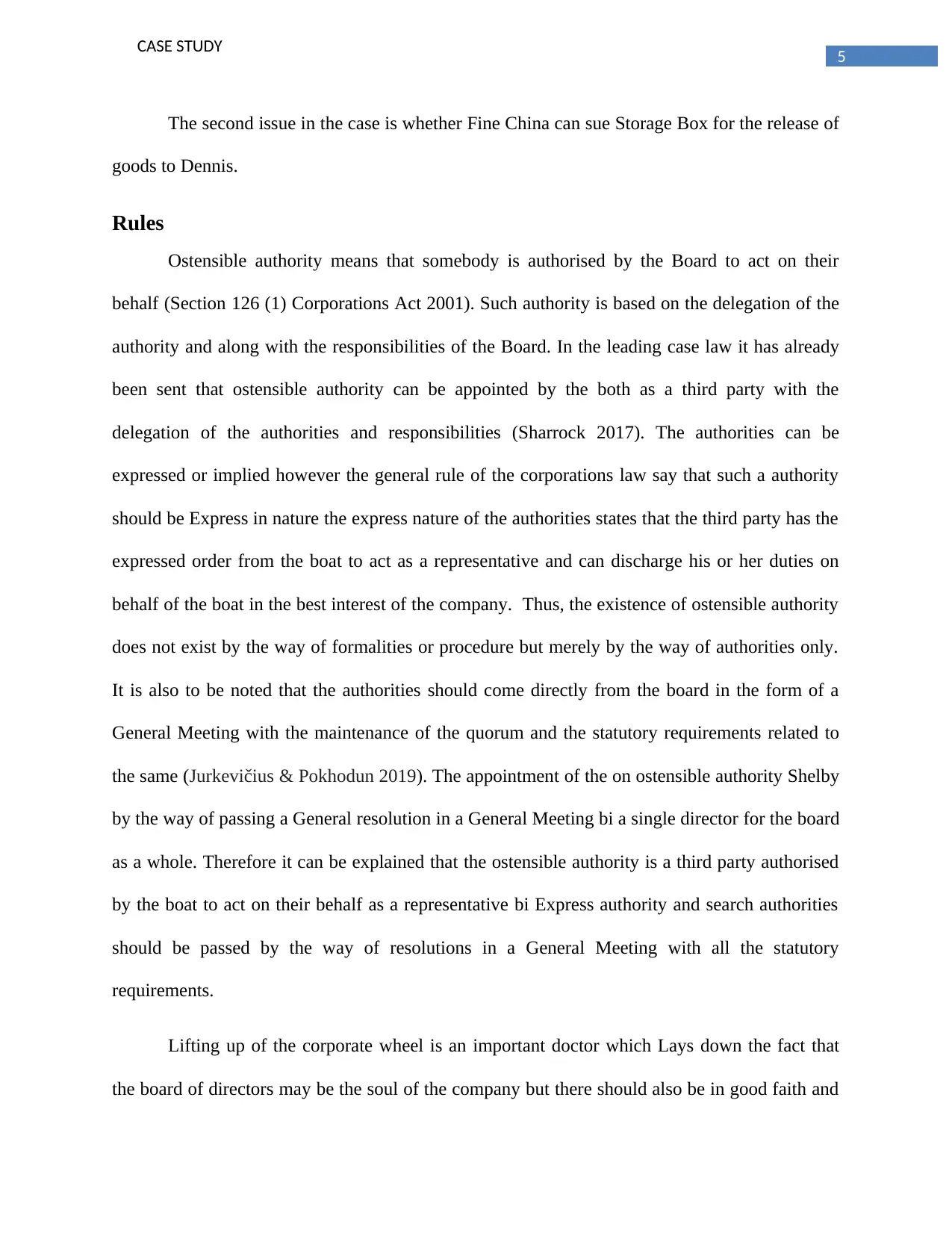
5
CASE STUDY
The second issue in the case is whether Fine China can sue Storage Box for the release of
goods to Dennis.
Rules
Ostensible authority means that somebody is authorised by the Board to act on their
behalf (Section 126 (1) Corporations Act 2001). Such authority is based on the delegation of the
authority and along with the responsibilities of the Board. In the leading case law it has already
been sent that ostensible authority can be appointed by the both as a third party with the
delegation of the authorities and responsibilities (Sharrock 2017). The authorities can be
expressed or implied however the general rule of the corporations law say that such a authority
should be Express in nature the express nature of the authorities states that the third party has the
expressed order from the boat to act as a representative and can discharge his or her duties on
behalf of the boat in the best interest of the company. Thus, the existence of ostensible authority
does not exist by the way of formalities or procedure but merely by the way of authorities only.
It is also to be noted that the authorities should come directly from the board in the form of a
General Meeting with the maintenance of the quorum and the statutory requirements related to
the same (Jurkevičius & Pokhodun 2019). The appointment of the on ostensible authority Shelby
by the way of passing a General resolution in a General Meeting bi a single director for the board
as a whole. Therefore it can be explained that the ostensible authority is a third party authorised
by the boat to act on their behalf as a representative bi Express authority and search authorities
should be passed by the way of resolutions in a General Meeting with all the statutory
requirements.
Lifting up of the corporate wheel is an important doctor which Lays down the fact that
the board of directors may be the soul of the company but there should also be in good faith and
CASE STUDY
The second issue in the case is whether Fine China can sue Storage Box for the release of
goods to Dennis.
Rules
Ostensible authority means that somebody is authorised by the Board to act on their
behalf (Section 126 (1) Corporations Act 2001). Such authority is based on the delegation of the
authority and along with the responsibilities of the Board. In the leading case law it has already
been sent that ostensible authority can be appointed by the both as a third party with the
delegation of the authorities and responsibilities (Sharrock 2017). The authorities can be
expressed or implied however the general rule of the corporations law say that such a authority
should be Express in nature the express nature of the authorities states that the third party has the
expressed order from the boat to act as a representative and can discharge his or her duties on
behalf of the boat in the best interest of the company. Thus, the existence of ostensible authority
does not exist by the way of formalities or procedure but merely by the way of authorities only.
It is also to be noted that the authorities should come directly from the board in the form of a
General Meeting with the maintenance of the quorum and the statutory requirements related to
the same (Jurkevičius & Pokhodun 2019). The appointment of the on ostensible authority Shelby
by the way of passing a General resolution in a General Meeting bi a single director for the board
as a whole. Therefore it can be explained that the ostensible authority is a third party authorised
by the boat to act on their behalf as a representative bi Express authority and search authorities
should be passed by the way of resolutions in a General Meeting with all the statutory
requirements.
Lifting up of the corporate wheel is an important doctor which Lays down the fact that
the board of directors may be the soul of the company but there should also be in good faith and
⊘ This is a preview!⊘
Do you want full access?
Subscribe today to unlock all pages.

Trusted by 1+ million students worldwide
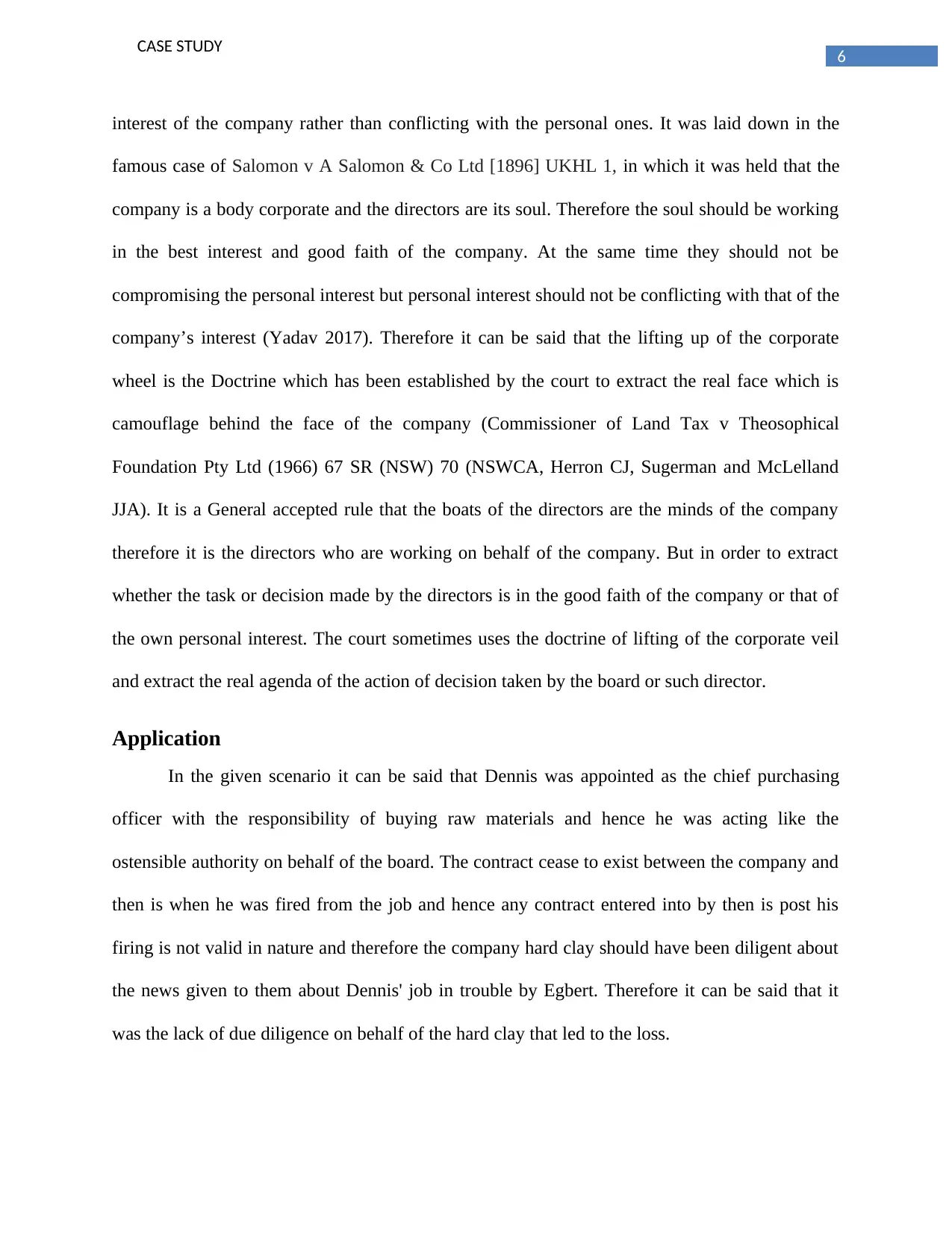
6
CASE STUDY
interest of the company rather than conflicting with the personal ones. It was laid down in the
famous case of Salomon v A Salomon & Co Ltd [1896] UKHL 1, in which it was held that the
company is a body corporate and the directors are its soul. Therefore the soul should be working
in the best interest and good faith of the company. At the same time they should not be
compromising the personal interest but personal interest should not be conflicting with that of the
company’s interest (Yadav 2017). Therefore it can be said that the lifting up of the corporate
wheel is the Doctrine which has been established by the court to extract the real face which is
camouflage behind the face of the company (Commissioner of Land Tax v Theosophical
Foundation Pty Ltd (1966) 67 SR (NSW) 70 (NSWCA, Herron CJ, Sugerman and McLelland
JJA). It is a General accepted rule that the boats of the directors are the minds of the company
therefore it is the directors who are working on behalf of the company. But in order to extract
whether the task or decision made by the directors is in the good faith of the company or that of
the own personal interest. The court sometimes uses the doctrine of lifting of the corporate veil
and extract the real agenda of the action of decision taken by the board or such director.
Application
In the given scenario it can be said that Dennis was appointed as the chief purchasing
officer with the responsibility of buying raw materials and hence he was acting like the
ostensible authority on behalf of the board. The contract cease to exist between the company and
then is when he was fired from the job and hence any contract entered into by then is post his
firing is not valid in nature and therefore the company hard clay should have been diligent about
the news given to them about Dennis' job in trouble by Egbert. Therefore it can be said that it
was the lack of due diligence on behalf of the hard clay that led to the loss.
CASE STUDY
interest of the company rather than conflicting with the personal ones. It was laid down in the
famous case of Salomon v A Salomon & Co Ltd [1896] UKHL 1, in which it was held that the
company is a body corporate and the directors are its soul. Therefore the soul should be working
in the best interest and good faith of the company. At the same time they should not be
compromising the personal interest but personal interest should not be conflicting with that of the
company’s interest (Yadav 2017). Therefore it can be said that the lifting up of the corporate
wheel is the Doctrine which has been established by the court to extract the real face which is
camouflage behind the face of the company (Commissioner of Land Tax v Theosophical
Foundation Pty Ltd (1966) 67 SR (NSW) 70 (NSWCA, Herron CJ, Sugerman and McLelland
JJA). It is a General accepted rule that the boats of the directors are the minds of the company
therefore it is the directors who are working on behalf of the company. But in order to extract
whether the task or decision made by the directors is in the good faith of the company or that of
the own personal interest. The court sometimes uses the doctrine of lifting of the corporate veil
and extract the real agenda of the action of decision taken by the board or such director.
Application
In the given scenario it can be said that Dennis was appointed as the chief purchasing
officer with the responsibility of buying raw materials and hence he was acting like the
ostensible authority on behalf of the board. The contract cease to exist between the company and
then is when he was fired from the job and hence any contract entered into by then is post his
firing is not valid in nature and therefore the company hard clay should have been diligent about
the news given to them about Dennis' job in trouble by Egbert. Therefore it can be said that it
was the lack of due diligence on behalf of the hard clay that led to the loss.
Paraphrase This Document
Need a fresh take? Get an instant paraphrase of this document with our AI Paraphraser
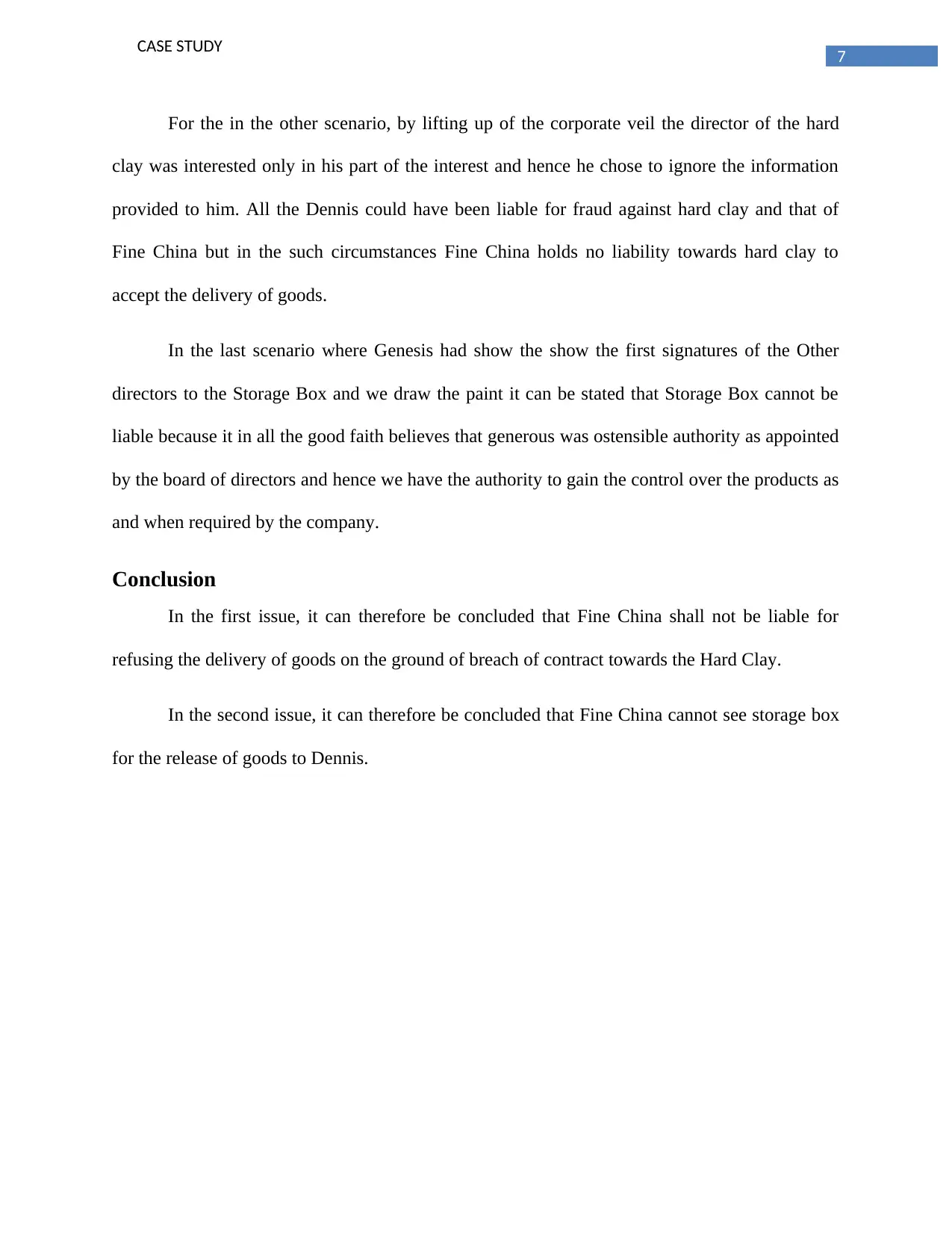
7
CASE STUDY
For the in the other scenario, by lifting up of the corporate veil the director of the hard
clay was interested only in his part of the interest and hence he chose to ignore the information
provided to him. All the Dennis could have been liable for fraud against hard clay and that of
Fine China but in the such circumstances Fine China holds no liability towards hard clay to
accept the delivery of goods.
In the last scenario where Genesis had show the show the first signatures of the Other
directors to the Storage Box and we draw the paint it can be stated that Storage Box cannot be
liable because it in all the good faith believes that generous was ostensible authority as appointed
by the board of directors and hence we have the authority to gain the control over the products as
and when required by the company.
Conclusion
In the first issue, it can therefore be concluded that Fine China shall not be liable for
refusing the delivery of goods on the ground of breach of contract towards the Hard Clay.
In the second issue, it can therefore be concluded that Fine China cannot see storage box
for the release of goods to Dennis.
CASE STUDY
For the in the other scenario, by lifting up of the corporate veil the director of the hard
clay was interested only in his part of the interest and hence he chose to ignore the information
provided to him. All the Dennis could have been liable for fraud against hard clay and that of
Fine China but in the such circumstances Fine China holds no liability towards hard clay to
accept the delivery of goods.
In the last scenario where Genesis had show the show the first signatures of the Other
directors to the Storage Box and we draw the paint it can be stated that Storage Box cannot be
liable because it in all the good faith believes that generous was ostensible authority as appointed
by the board of directors and hence we have the authority to gain the control over the products as
and when required by the company.
Conclusion
In the first issue, it can therefore be concluded that Fine China shall not be liable for
refusing the delivery of goods on the ground of breach of contract towards the Hard Clay.
In the second issue, it can therefore be concluded that Fine China cannot see storage box
for the release of goods to Dennis.
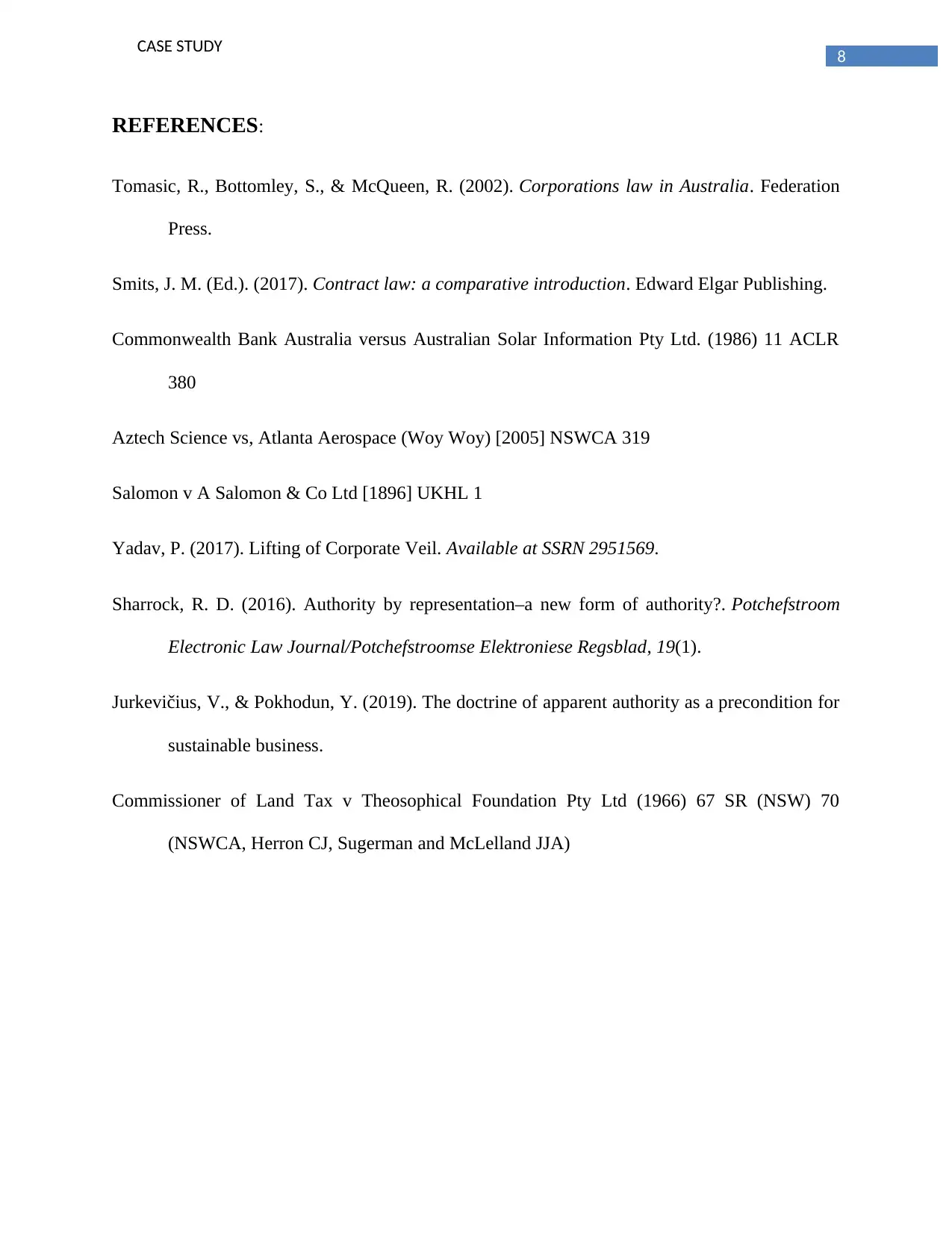
8
CASE STUDY
REFERENCES:
Tomasic, R., Bottomley, S., & McQueen, R. (2002). Corporations law in Australia. Federation
Press.
Smits, J. M. (Ed.). (2017). Contract law: a comparative introduction. Edward Elgar Publishing.
Commonwealth Bank Australia versus Australian Solar Information Pty Ltd. (1986) 11 ACLR
380
Aztech Science vs, Atlanta Aerospace (Woy Woy) [2005] NSWCA 319
Salomon v A Salomon & Co Ltd [1896] UKHL 1
Yadav, P. (2017). Lifting of Corporate Veil. Available at SSRN 2951569.
Sharrock, R. D. (2016). Authority by representation–a new form of authority?. Potchefstroom
Electronic Law Journal/Potchefstroomse Elektroniese Regsblad, 19(1).
Jurkevičius, V., & Pokhodun, Y. (2019). The doctrine of apparent authority as a precondition for
sustainable business.
Commissioner of Land Tax v Theosophical Foundation Pty Ltd (1966) 67 SR (NSW) 70
(NSWCA, Herron CJ, Sugerman and McLelland JJA)
CASE STUDY
REFERENCES:
Tomasic, R., Bottomley, S., & McQueen, R. (2002). Corporations law in Australia. Federation
Press.
Smits, J. M. (Ed.). (2017). Contract law: a comparative introduction. Edward Elgar Publishing.
Commonwealth Bank Australia versus Australian Solar Information Pty Ltd. (1986) 11 ACLR
380
Aztech Science vs, Atlanta Aerospace (Woy Woy) [2005] NSWCA 319
Salomon v A Salomon & Co Ltd [1896] UKHL 1
Yadav, P. (2017). Lifting of Corporate Veil. Available at SSRN 2951569.
Sharrock, R. D. (2016). Authority by representation–a new form of authority?. Potchefstroom
Electronic Law Journal/Potchefstroomse Elektroniese Regsblad, 19(1).
Jurkevičius, V., & Pokhodun, Y. (2019). The doctrine of apparent authority as a precondition for
sustainable business.
Commissioner of Land Tax v Theosophical Foundation Pty Ltd (1966) 67 SR (NSW) 70
(NSWCA, Herron CJ, Sugerman and McLelland JJA)
⊘ This is a preview!⊘
Do you want full access?
Subscribe today to unlock all pages.

Trusted by 1+ million students worldwide
1 out of 9
Related Documents
Your All-in-One AI-Powered Toolkit for Academic Success.
+13062052269
info@desklib.com
Available 24*7 on WhatsApp / Email
![[object Object]](/_next/static/media/star-bottom.7253800d.svg)
Unlock your academic potential
Copyright © 2020–2026 A2Z Services. All Rights Reserved. Developed and managed by ZUCOL.





